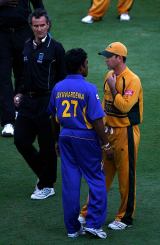Crowe takes blame for light chaos
The match referee Jeff Crowe took the blame for the farcical finish to the World Cup final
AFP
29-Apr-2007
|
|

|
The match referee Jeff Crowe took the blame for the farcical finish to the World Cup final which saw Australia celebrate victory twice and forced Sri Lanka to bat in pitch-black darkness. But he suggested the third umpire Rudi Koertzen may have initiated the process leading to chaotic scenes at the climax of the game.
Crowe, despite heading up a team of officials which included the umpire Steve Bucknor, standing in a record fifth World Cup final, managed to overlook a basic playing condition which states that once 20 overs have been bowled in both innings enough cricket has been played to create a match. A result can then be declared under the Duckworth-Lewis system for rain-affected games.
Instead the teams, following instructions from Bucknor and Pakistan's Aleem Dar, came back on to bowl three more overs in gathering gloom. Both Mahela Jayawardene and Ricky Ponting rightly thought the game had finished. With the match gone from Sri Lanka, Jayawardene and Ponting came to an arrangement that it would finish with Sri Lanka facing slow bowling as a safety precaution after the umpires had incorrectly told them they would otherwise have to come back on Sunday's reserve day.
"In hindsight, I should have known the rules and said the game had been called off. I'm very embarrassed for the playing control team today," Crowe said after the officials had been booed during the trophy presentation ceremony. "For me the real confusion has come from the fact we were talking about resuming the game tomorrow, which was technically wrong."
Crowe said he and the on-field umpires, as well as Koertzen, were all involved in the discussion which left both sides stunned when, after Sri Lanka had gone off for bad light at the end of the 33rd over, they found themselves all coming back out again. "Sometimes you get a stronger voice which says: 'I know the rules - this is how it works'," Crowe said. "Then you get a bit of confusion in the group itself, and no one wants to overrule the other. The match referee should have known and said 'that's not right - the game should be completed now'."
Crowe said the officials took "collective" responsibility but suggested Koertzen had played a significant role. "Rudi was talking about the allowances and talking about the possibility of tomorrow," he said. "I don't think it's Rudi's mistake, it's a collective mistake. The fact Rudi might maybe have suggested it early doesn't mean the other umpires couldn't have over-ruled him. The two on-field umpires are the ones who control the match."
Asked if it was a resigning issue, Crowe said: "I'll have to talk with my superiors on that. But I hope not."
Jayawardene found out about the umpire's mistake after the match. "Obviously our understanding was that once we complete 20 overs under D/L it's a completed game," he said. "With 70 runs to get off 20 balls, and with Glenn McGrath and Shaun Tait bowling in that light, our guys wouldn't have seen anything, we just wanted to finish the game. "At that point [playing on] was a goodwill gesture. Australia deserved to win because the way they played today, simple as that."
Ponting joked: "If the umpires don't know, I don't know. It appeared we had a premature celebration for the best part of ten minutes. I thought Aleem was having a bit of a joke with us when he said it looks like we'd have to come back tomorrow and play three overs. I said: 'Mate, we've played the 20 overs, we've actually finished the game.'"